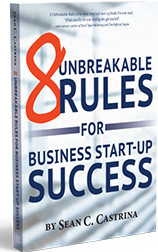Today we are talking about 4 Ways to Respond to a Competitor Underpricing You!
This is why I’m a fan of writing a business plan before you get started. I have considered businesses before and then when I looked at my competitor’s pricing, I was like, I can’t. There’s not enough meat on this bone. Based on my profit margins, I couldn’t get the talent to perform at the level that we would need to based on the type of company I want to run. If you’re the cheapest person in town, there’s just no margins there, so I encourage you to create a business plan so you don’t discover this a year or several months into your startup.
How should you respond when your competitor is under pricing your business?
Wait Them Out
You may not like this one, but this is what I have always learned, and it’s true. Wait for them to go out of business because sheep will never last. It doesn’t mean you close up shop, it means you keep doing what you’re doing. It’s typically mathematically impossible for them to do business long term at those prices, unless you can do the massive margins and volume of like a Walmart or Amazon. I don’t think Amzon even makes an effort to be the least expensive online store. I buy from Amazon based on convenience, and that’ll tie into what I’m going to share with you a little bit later.
A lot of startups will start with low prices and I’m telling you that is a dangerous road. There’s nowhere else to go. You can’t come back from being the lowest. Once you go down that road and your customers know you’re the least expense. If you’re the cheapest, you get that banner stuck to your business. You can’t come back from that.
So what I would encourage you to do is to wait for them to fail. Because they will suffer. They’re going to lose employees and they’re going to go out of business. I have been in business 21 years and every one of my competitors that I really thought were great eventually went by the way side because they all tried to beat us on price. We crushed them on quality and being systematized and our reputation. We won the race and our pricing is so much more expensive. It’s just not a fair fight. We can out-market. When you Google their companies, our company comes up, number one.
I don’t recommend being the cheapest because it just doesn’t create a good core business.
Add More Value
Consider adding more value, more services, more product features, or more benefits to your offering.
This is what we did. One of our business models is a service company. When we start your job, we don’t stop until we’re finished, we don’t leave until we’re finished. We’re at your jobsite the first day and come back each day thereafter until it’s done. We don’t put anybody in your home that wouldn’t be in my home. In other words, we put quality people in there. We don’t put anybody in your home without 10 years experience.
I kept playing with all these little things because I know that people care about who’s in their house, so instead of fighting the price front, I focused on who we’re going to put in your home. Typically, during the day when you’re doing home services, generally the husband is working and if somebody is home, it is most times the wife, and the husbands don’t want Godzilla walking around their house.
So you should look at how you can fight on a different front. How can you provide more value to justify your pricing?
Create More Credibilitiy
You need to create more credibility to make paying your prices a safer decision. Oeople want to feel like the decision they’re making is safe. People like to know the details. They are paying you this, the product is going to do what it says it’s going to do or they’re paying you to fix something. They don’t like to wonder if it’s actually going to work. They want to trust you. Maybe you’re an A-plus rated company with the Better Business Bureau. Maybe you have logos on your website from different industry groups and certifications, however, you can make your company look more credible. The person who’s typically the least expensive is generally not the most credible. I’ve never seen that happen.
You gotta win on another pillar, and that’s credibility. You want to make them believe that, if they buy your product, it’s going to do what you says it’s going to do. You could have a great return policy, great testimonails, BBB ratings, etc.
Talk to the Customer
Ask them:
- Do they believe the least expensive company can provide a warranty and will rush back to service that warranty when they made very little money on their product or service?
- Do you believe they’re going to provide exceptional quality. Do you really believe that they can hire employees talented enough to provide the quality that you want?
These are rhetorical questions. They won’t be able to deliver on these promises. I get told that my prices are high and think my business is easy and I see my new competitors come and they go. I’ve had big franchises come to my town and I sent them out two years later with their tail between their legs, too.
I’m not lowering our standards, but our reputation, the value we provide, and the quality we provide is second to none. The customer service experience, how quickly we follow up on warranties, the type of people that we put in your home, the buying experience is exceptional and we promote it in every medium. We don’t make it a fair fight.
What you don’t want to do is lower your pricing. You should create a business plan before you start your business. Figure out what your competitor is doing and why they are cheap. See where they are week and exploit those weaknesses. Let’s say they have a 90-day warranty, so you go to a one-year warranty. Just don’t lower your prices. That’s conceding and you’re going to lose the war there. Consider adding more value. Give more reasons, more product features, more benefits, just make the money that they pay you worth it. Be more credible. That gives them peace of mind. That takes out skepticism. Then you show them how you balance your prices with the quality of product or service, with a warranty and great customer service.


